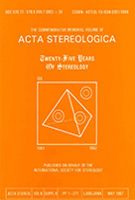Usefulness evaluation of the stereological methods applied for grain size estimation
Abstract
The computer simulated 3D models of one—phase polycrystalline materials were applied for assessment of precision and versatility of hitherto used methods for grain volume distribution. The precise quantitative description of model structures of sufficient grain size and shape inhomogeneity in 2D and 3D spaces enabled the unequivocal comparison of the results of grain size evaluation obtained with:
-
Classical method: Scheil—Schwartz—Saltykov’s, Saltykov’s, Spector’s, Saltykov’s method of inverse diameter
-
Empirical equations: Hanson’s, Nunez-Domingo’s, Okada—Katsulai—Oka’s
-
Modern stereology methods: point sampled intercepts and disector
A basic criterion of the evaluation was a relative error of stereological parameters obtained with these methods. It was shown that method ensuring the required versatility and accuracy of grain size evaluation at acceptable labor consumption and cost had not been worked out yet.

